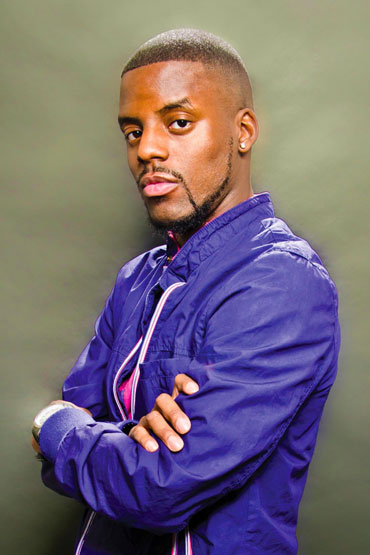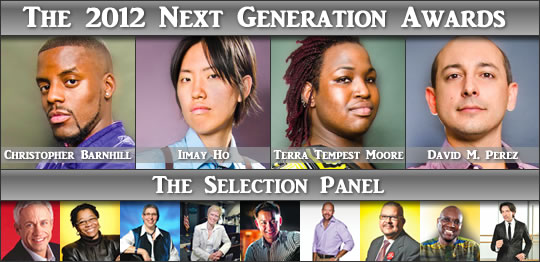Christopher Barnhill may be only 25 years old. But to hear this Metro Weekly Next Generation Award winner tell it, he's already fulfilling his life's purpose.
As a schools engagement manager with Metro TeenAIDS, a D.C. organization working to prevent the spread of HIV among young people and improve the quality of life for those already infected, Barnhill is often on the front lines of the emerging HIV epidemic, seeing firsthand how it affects marginalized youth.

Christopher Barnhill
(Photo by Julian P. Vankim)
''I feel that God has kept me here for an essential purpose,'' he says of his work. ''All the things I've gone through in my life have brought me to this moment, to handle this big task.''
Barnhill knows personally how tumultuous an HIV diagnosis can be in a young person's life. Orphaned at age 2, Barnhill was born HIV-positive following his mother's struggle with heroin addiction and subsequent infection. She AIDS-related complications not long after.
But Barnhill – who was raised by his aunt in Prince George's County, along with his brother, two sisters and three cousins – didn't know he was HIV-positive. His family had decided to keep it a secret. Instead, Barnhill learned of his status when he got tested at a school health fair when he was 16.
Initially, Barnhill assumed he'd been infected through sexual behavior, despite believing he had done everything in his power to protect himself. He continued to believe so, even as his former sexual partners tested negative, until two years later when his aunt revealed to him that he had been born with the virus.
''I felt a sense of betrayal,'' Barnhill says of his aunt's admission and decision not to tell him he was HIV-positive. ''I used to be very angry about it. There were a lot of emotions that I didn't speak out loud or even understand until I had gotten older and matured a little bit.
''And I was like, 'You know what? I can't really fault them for not telling me. I can be pissed as hell, but I can understand the situation.' I was born in 1987. That was around the time where if you even breathed the word 'HIV,' it was a problem. And coming up in the African-American community, where much isn't talked about and things that go on inside the family are pretty much swept under the rug, I can understand why they kept it from me. Their purpose was to keep me protected. With that frame of mind, it allows me to rest a little easier.''
As Barnhill sees it, it's all part of God's plan. A very religious person who's a licensed youth minister at the Community Church of Washington, D.C., Barnhill says his unique experience has shaped him for his current job.
''All things will unfold in their due season,'' he says of this purpose. ''Everything in its divine order.''
Barnhill says his diagnosis prompted him to get involved, to advocate on behalf of young people like himself who are infected with HIV. He said his first experience as an activist was when he helped coordinate World AIDS Day at his high school, for which he was expected to address the student body during morning announcements.
In the course of planning the event, one of his teachers made an offhand remark that it would be great if the students could hear from somebody who was HIV-positive, prompting Barnhill to share his status with his school of more than 2,000 students.
''This big ol' lightbulb clicked in my head, and was like, 'Chris, this is the moment,''' he recalls.

Christopher Barnhill
(Photo by Julian P. Vankim)
From there, Barnhill moved on to Metro TeenAIDS, where he put his efforts into managing the care of HIV-positive young people. Then he tackled prevention, focusing his efforts on outreach to D.C. teens. As a schools engagement manager, Barnhill trains facilitators and teachers within the District's public and charter school systems to promote responsible decision-making regarding sex. Barnhill says making sure those who have direct contact with students are properly trained is important, because in his experience it can be the adults rather than students who are hostile to broaching issues of sex, HIV/AIDS and homosexuality.
''You always think that the bullies are going to be the students,'' Barnhill says. ''But, really, sometimes the bullies are the teachers.''
Barnhill recounts, for example, that after sharing his HIV status with his school, most backlash came from teachers. Some told his guidance counselor that he shouldn't have addressed the issue. Barnhill says the principal even told him he had acted inappropriately and that she wanted him suspended.
''They thought parents were going to withdraw their kids from the school, like some kind of big Ryan White-type story,'' Barnhill says. ''I explained to them that if they did that, I would have every news and radio station that could pick up the story at the school.'' It never came to that.
Today, Barnhill says the biggest challenges facing youth, particularly LGBT youth, are that the existing resources to help people protect themselves from HIV are not youth-friendly. He also says there are far too few mentors willing to befriend the younger generation of LGBT youth.
''Some people are so scared of our youth that they don't want to reach out,'' he says. ''What I see in the LGBT community is LGBT people graduate from college, escape their home lives, relocate to a new city, get a fancy job with fancy new friends, and forget about the other LGBT youth they left behind.''
Barnhill reasons that some of the problems affecting young adults could be more easily resolved if they were engaged by more experienced people who could help them navigate challenges. Good role models, he says, could guide youth away from the immediate comforts of drugs and possibly reckless sex, and onto healthier, more fulfilling paths.
''There are a lot of influential people in this city who are LGBT, and I see them doing things with an impact in their specialty areas. I wish that could extend to young people as well. We can't afford for young people to get lost in the cracks.''
 ...more
...more